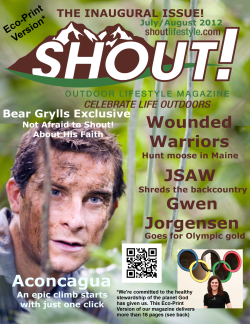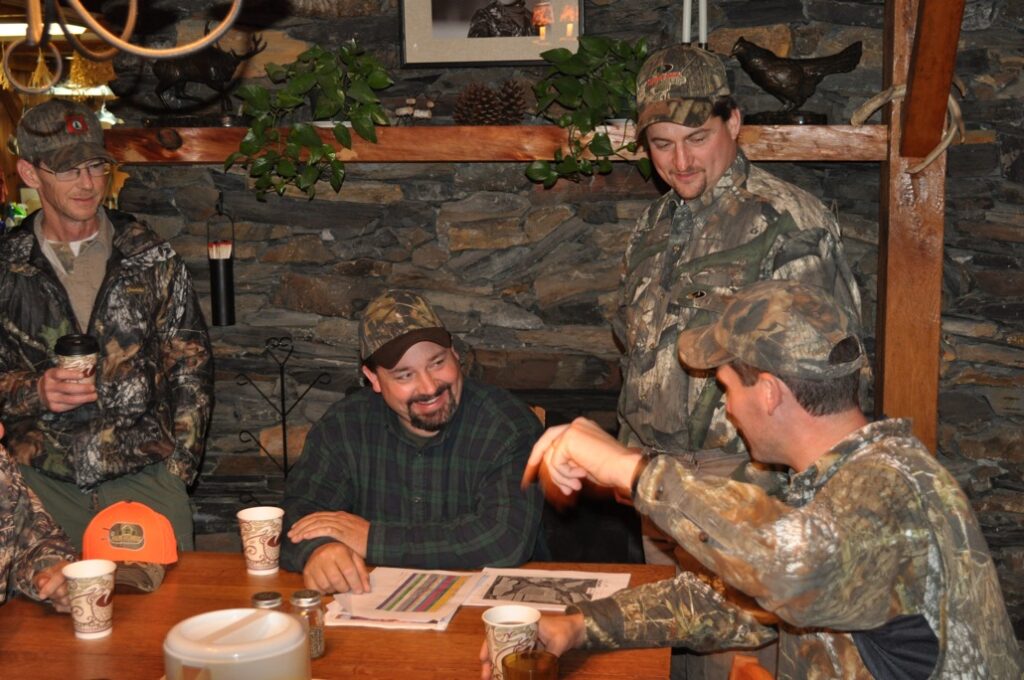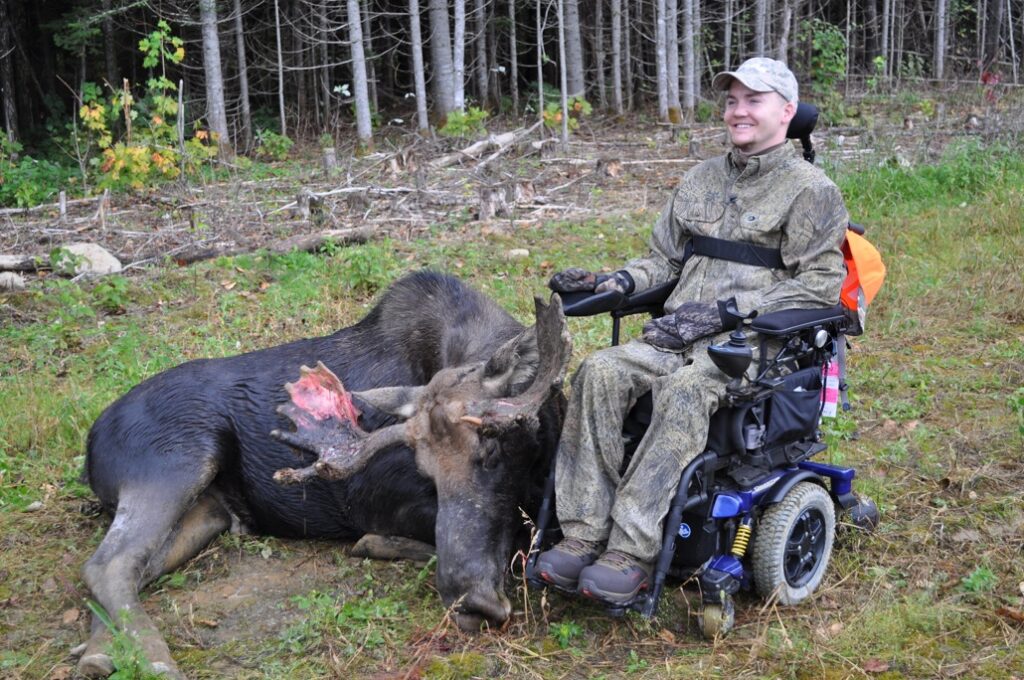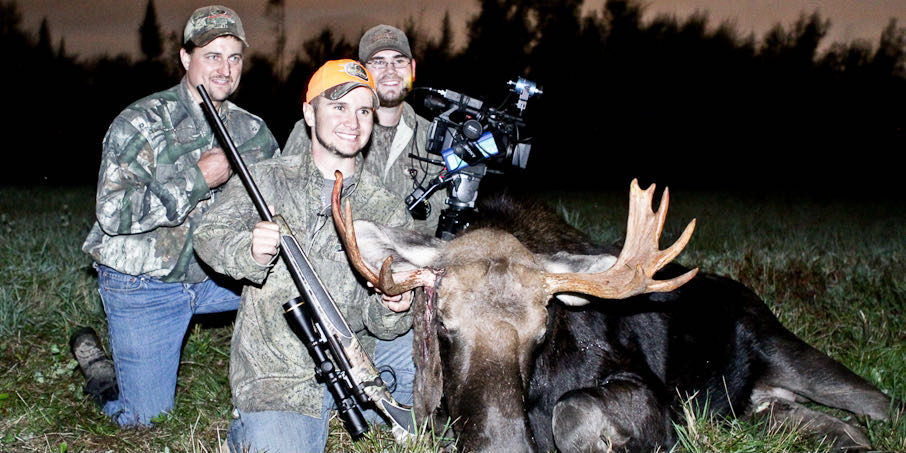The outdoors is a tremendous venue in which one can escape the pressures and stressors of daily life and relax in solitude. The therapeutic benefits offered through various forms of outdoor recreation are numerous and well documented in validated research, anecdotally, and also in scripture. If you recall, Jesus often retreated to the wilderness or out of the way natural places to escape the pressures he was facing. The disciples blew off steam by going fishing. In season you can do moose therapy.

This article is Copyright 2012 by Douglas Gilmer. It originally appeared in the July/August 2012 issue of Shout! OUTDOOR LIFESTYLE MAGAZINE.
This article is Copyright 2012 by Douglas Gilmer. It originally appeared in the July/August 2012 issue of Shout! OUTDOOR LIFESTYLE MAGAZINE.
Today, one particular group of people that is benefitting tremendously through outdoor recreation and retreat type settings is our wounded warriors. Many men and women in our armed forces have served multiple combat tours over the past 12 years and a significant number are returning with scars and permanent physical injuries that impact the way they are able to enjoy certain recreation opportunities they once found easy. Even more men and women are returning with unseen injuries such as post-traumatic stress (PTS) and traumatic brain injuries (TBI). Though maybe not visible to the eye, these injuries are just as or even more so debilitating in many cases. To help these men and women, Smoldering Lake Outfitters in Bridgewater, Maine, began hosting groups of wounded warriors at their lodge for black bear, moose, waterfowl, and turkey hunting and fishing adventures a few years ago. I have had the privilege of participating along the way.
Last fall, 13 wounded warriors made their way to northern Maine to participate in a special moose hunting opportunity. Making this hunt unique was the fact that hunters included not only wounded warriors from Iraq and Afghanistan, but they were joined by several wounded veterans from Vietnam. This mix of ages made for a very special dynamic in camp. The older veterans, many of whom were forced to deal with emotional and mental scars they carried home with them were able to share what they had learned with the younger warriors. The younger warriors saw the older veterans as mentors. The older veterans felt as if they were able to contribute something meaningful to the care and recovery of the younger men.

Northern Maine has a moose density that rivals the deer density in many areas of the southeast; 20 moose per square mile in some places. No doubt an over population of whitetail can cause havoc on crops, gardens and natural food sources, just think what the same number of deer could do if each one that stepped into your backyard garden weighed 1000 pounds. In northern Maine agriculture is the big business and one of the largest crops is broccoli. It just so happens that moose love broccoli and these giant members of the deer family will travel great distances to gorge themselves on this delicacy (sans ranch dressing nonetheless) while causing millions of dollars in crop damage along the way. To help control the growing moose population and in an effort to help local farmers, the state of Maine implemented a special moose management hunt for the late summer and early fall. These hunts are limited to selected agricultural areas to maximize the hunt’s intended purpose. These are not easy “fish in a barrel” hunts, however. For starters, you can’t shoot a moose in a broccoli field without destroying huge amounts or produce. The trick is to intercept the moose in edge habitat and travel corridors before they actually reach the fields. Access to these areas is generally much easier than a trip into the deep Maine wilderness for moose, such as during the regular hunting season, and access to hunting areas can be accomplished by motorized vehicle. This makes it an ideal hunt for wounded warriors or others with physical impairment that might otherwise have difficulty traversing more rugged terrain. The Maine Department of Inland Fisheries and Wildlife, the Governor’s office, and the state’s Bureau of Veteran Services have been all incredibly supportive in making sure wounded warriors have the opportunity to participate in this very special event. House in the Woods, another Maine based veterans outdoor rehabilitation program has also played a major role in these events and members of the Maine Guides Association donate their time to help the wounded warriors achieve their success.
Of the 13 wounded warriors who came to Smoldering Lake Outfitters last fall, 12 ended up taking home a moose. For most, this was their first time moose hunting and for some the first time they ever hunted at all. However, this was more than just a hunt. Smoldering Lake Outfitters has always operated with the philosophy that anyone can sell a hunt, they offer an experience. This same philosophy has translated into the events they offer for wounded warriors. Each event is designed to provide an opportunity for therapy and caring support within a family atmosphere. Hunters are paired with mentors and caregivers who can assist them as well as facilitate meaningful discussion. Times are specifically set aside for participants to relax, reflect, and converse with each other in a non-threatening and non-attribution environment. Mentors who have been trained to help wounded warriors cope with stress stemming from physical injury, PTS, and TBI are on hand to aid in fostering resiliency for these men and women who have sacrificially given so much of themselves. Participants are challenged through the event to leave their comfort zones and push themselves physically to build confidence and help instill a more resilient spirit.
Nick Orchowski is 27 years old and on May 1, 2005, just 15 months into his Army career, was a turret gunner in a convoy when they were ambushed by a vehicle born improvised explosive device. His injuries left him a quadriplegic. To see Nick walking, however, one would never guess he was once completely paralyzed. One day he found himself with the ability to walk. When asked how this happened, Nick said the doctors don’t even know and that medical experts all tell him there is no human explanation as to why or how he is able to walk. Nick added, “I have learned that sometimes it is best not to wonder why and I am not going to second guess God.” Nick added that for him this hunt was an opportunity that “removed the obstacles between normal and injured and allowed me to focus on something other than physical pain and medication”.

Matt Keil, an Army sniper, was shot by an enemy sniper on his second combat tour, February 24, 2007. He was left instantly paralyzed with only minimal movement in his hands. Confined to a wheel chair equipped with adaptive devices, Matt was truly determined. When he and his team spotted a moose, instead of taking a long shot from where they were sitting, Matt insisted on sneaking as close as possible to the moose using his adaptive chair. With the stealth one would expect of a skilled Army sniper, Matt closed the distance as far as he could before shooting his moose using a special mount on his chair and a blow tube that fired the weapon. Matt said the experience gave him a “vote of confidence”. He added, “The people here don’t see a wheelchair, they just see me, the person. They made me feel normal”.
First time hunter, Sgt. Sean Johnson, USMC, was wounded in an ambush on October 14, 2010. To be honest, when speaking to Sean, I simply put down my pen and paper when he described to me the events of that ambush, the firefight, his injuries, and watching as other members of his squad were killed and wounded. Sean said, “While I am here, I feel as if I have permission to be vulnerable with those around me. I can open up.” He then added, “This is the first time since I was in Afghanistan that I can honestly say I feel like I was back in a platoon, because people here care about me.”
Randy “Doc” Simone was corpsman who served and was wounded in Vietnam. For Doc, this hunt provided him not only the opportunity to hunt but also the chance to revert back into the caregiver mentality he learned on the battlefield. Randy quickly found himself attached to the younger men that came on the hunt and provided them with understanding and lessons he learned from his own experiences on how to best cope with many of the unseen issues the men were dealing with.
Dave Hentosh, owner of Smoldering Lake Outfitters, said he is motivated by the words Jesus spoke and are recorded in Matthew 11:28:
“Come to Me, all of you who are weary and burdened, and I will give you rest.”
Hentosh adds, “Jesus cared not only for the spiritual needs of others but scripture is clear that he also cared about the physical and emotional needs of people. He met their individual needs first and then their spiritual needs. These men and women have given so much of themselves, they have sacrificed greatly, their blood has stained the soil of faraway places, and for many, reminders of the war have returned home with them. We owe it to them to help them get their lives back.”
Yes we do. Thank God for moose, and broccoli.
For more information about Smoldering Lake Outfitters visit www.Smoldering-Lake-Outfitters.com.
House in the Woods: http://houseinthewoods.org/





2 Responses
I’m a bit confused as to how shooting an innocent animal and smiling about it would provide a release. For those that have returned from a stressful war zone where gunfire can be a (pardon the pun) trigger for bringing on severe panic attacks, I seems so impractical and unethical. Additionally, Jesus did retreat to the wilderness but to pray, not slaughter.
Murray, Thank you for taking time to share your thoughts.
Allow me to say that my reply here and my position as publisher of Shout! OUTDOOR LIFESTYLE MAGAZINE isn’t to ‘defend’ every perspective or position presented by contributors. The magazine is intended to be a forum for conversation and discourse and a tool for which each of us can more deeply consider, “What would God have ME do?”.
From a “practical” aspect for meat eaters, moose hunting is indeed a source of healthy and flavorful food. From an “ethical” aspect, I believe many people find killing animals to be something they would not want to watch, do or contribute to (although if they eat meat then they do contribute to killing animals). From a “therapy” aspect, this article suggests that hunting has value. You however, bring out a good point that it could be a “trigger” for PTSD and I suspect there are research and writings to that end.
I’m certain, based on my observation of how many people I’ve found who are both enthusiastic hunters and passionate Christians, that there surely has to be (publicly available) some very thoughtful perspectives on why they value hunting and don’t find it to be in conflict with their faith in God. I should be more familiar with their thinking but I’m not.
I’ll simply say that throughout the Bible there are references to animals being killed, not the least of which is the story of Jesus Christ blessing the loaves and ‘fish’ to feed a mass crowd. I know in Old Testament writings some classes of animals are identified as unclean and not to be eaten. I don’t think the Bible says anything specifically about recreational hunting etc. But certainly the simple commandment, “Thou shalt not kill” is a compelling call NOT to hunt.
For the record, I’m not a hunter. Personally I’m a big advocate that hunting should ultimately result in human sustenance and not be recreational only.
I’m pretty certain that expressions in the Bible like, “who can know the mind of the Lord” and notably in Romans 12:18, which states, “If it is possible, as far as it depends on you, live at peace with everyone” and Ephesians 4:2, which advises to “be completely humble and gentle; be patient, bearing with one another in love,” are some key biblical provisions to help us pursue after some sort of peace with others.
I really appreciate you sharing your heart on this matter and pray that your shared insights will challenge all of our readers to pursue after God’s Spirit more deeply.
-Brad Bloom, Publisher